Effects Of Solar Power Farms On The Environment
Solar farms harness energy from the sun to create clean, renewable electrical energy. Unlike fossil fuels such as coal, generating electricity from renewable sources like solar power creates no emissions that are harmful to human health and the environment. However, solar farms also pose real environmental challenges, including habitat degradation and harm to wildlife.
Reduced Emissions
Reduced Emissions
Almost 70 percent of electrical power in the U.S. came from fossil fuels like coal, natural gas and petroleum as of 2010. Burning these substances releases chemicals into the atmosphere, including greenhouse gases that drive climate change, and toxic chemicals like mercury and arsenic. In contrast, solar power produces little to no emissions, because it does not use chemical fuels. As electricity from solar farms supplants energy from coal plants, they reduce overall chemical output into the environment.
Harm to Wildlife
Harm to Wildlife
In order to provide a significant amount of electrical energy, solar farms require large tracts of land. Western states like California have deserts with abundant space and sunshine, but these areas are also natural habitats that support wildlife. For example, environmental reports underestimated the number of desert tortoises that would be displaced by the Ivanpah Solar Generating System in California's Mojave Desert. The same solar farm also came under scrutiny when an increasing number of bird deaths were reported on its premises. Many of their wings had been melted or burned off by heat from the solar farm's mirrors.
Habitat Degradation
Habitat Degradation
The impact that solar farms have on individual species can send ripples throughout entire ecosystems. For example, animals like burrowing owls in California's Mojave Desert rely on burrows dug by desert tortoises for shelter (See Reference 4). When solar farms harm or remove species within a habitat, they also remove the valuable ecosystem services that they provide to the habitat. The habitat becomes less livable for plants and wildlife that have adapted to its specific conditions.
Environmental Debate
Environmental Debate
The controversy surrounding solar projects has caused division among environmentalists. Renewable energy development and the reduction of greenhouse gas emissions are important goals for many environmental advocates, but so is conservation of habitat and species diversity. These stances offer valid environmental arguments both for and against solar power farms. There may not be a perfect answer to this problem, but it is important to recognize both views in the debate to find reasonable solutions.
Cite This Article
MLA
Laine, David C.. "Effects Of Solar Power Farms On The Environment" sciencing.com, https://www.sciencing.com/effects-solar-power-farms-environment-13547/. 24 April 2017.
APA
Laine, David C.. (2017, April 24). Effects Of Solar Power Farms On The Environment. sciencing.com. Retrieved from https://www.sciencing.com/effects-solar-power-farms-environment-13547/
Chicago
Laine, David C.. Effects Of Solar Power Farms On The Environment last modified August 30, 2022. https://www.sciencing.com/effects-solar-power-farms-environment-13547/
